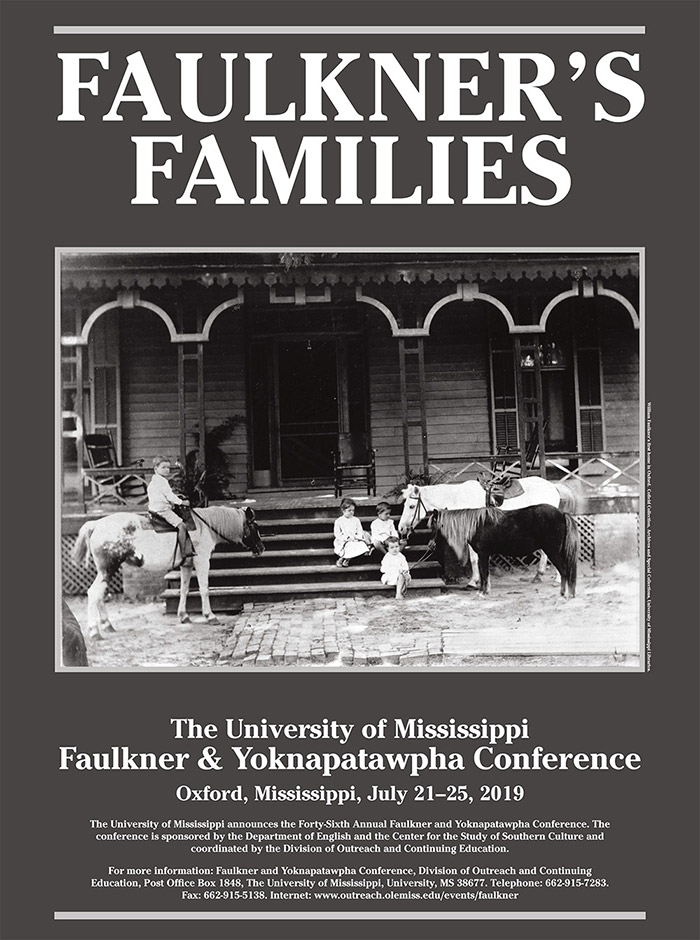
Panel. The Region, The Globe, The Cosmopolitan
Location
Nutt Auditorium
Start Date
24-7-2019 2:00 PM
Description
- Panel Chair: Sarah Gleeson-White, University of Sydney
- Scenes of Embarrassment in the Aristocratic Families of Faulkner and Bahman Farmanara / Pardis Dabashi, University of Nevada, Reno
- Existentialism, Estrangement, Extinction: Faulknerian Cosmopolitanism and the Family Network / Robert Jackson, University of Tulsa
- Faulkner and Jimmy McCudden at the Savoy / Michael Zeitlin, University of British Columbia
In A Fable, RAF Pilot David Levine recalls the time when “he and two others were celebrating their commissions, pooled their resources and went to the Savoy and McCudden came in” to “an ovation, not of men but of women.” Levine then returns to the present, “unrolled the sidcott,” and watched it burn in “a series of smoldering overlapping rings across the front of it, but now it had become one single sprawling ragged loop spreading, creeping up toward the collar and down toward the belt and across toward each armpit, until by morning the whole front would be gone probably.” My paper traces the genealogy of this mysterious scene through Faulkner’s family history, the fullest biographical and historical context for a life and a martial dream slowly consuming itself. As the sidcott burns Levine recalls his mother, “she the woman for whom [. . .] he was to seek garlands or anyway sprigs of laurel at the cannon’s mouth,” and conjures some of the pilots—some dead, some living--whose names arise as if from the smoldering flight suit itself: “Ball and McCudden and Bishop and Rhys Davies and Barker, and Boelcke and Richthofen and Immelman and Guynemer and Nungesser and the Americans like Monaghan who had been willing to die even before their country was even in it to give them a roster of names to brag about.” William Faulkner and David Levine don’t quite make the list, but as thwarted pilots they need to be understood in relation to the air-war myth that captivated them, their families, and the public at large. The names as Faulkner collects them here—British, Canadian, French, American, German—also postulate what Freud called in “Thoughts for the Times on War and Death” (1915) (written while two of his sons were serving in the Austrian army, with a third soon to volunteer) “a new and wider fatherland” now being destroyed by the escalating world war. The internationalism that Faulkner encountered in his military experience and fascinations complicated his regional, nationalistic, and cosmopolitan affiliations as they can be discerned in A Fable and elsewhere in his writings about war.
Relational Format
Conference proceeding
Recommended Citation
Gleeson-White, Sarah; Dabashi, Pardis; Jackson, Robert; and Zeitlin, Michael, "Panel. The Region, The Globe, The Cosmopolitan" (2019). Faulkner and Yoknapatawpha Conference. 25.
https://egrove.olemiss.edu/fy/2019/schedule/25
COinS
Jul 24th, 2:00 PM
Panel. The Region, The Globe, The Cosmopolitan
Nutt Auditorium
- Panel Chair: Sarah Gleeson-White, University of Sydney
- Scenes of Embarrassment in the Aristocratic Families of Faulkner and Bahman Farmanara / Pardis Dabashi, University of Nevada, Reno
- Existentialism, Estrangement, Extinction: Faulknerian Cosmopolitanism and the Family Network / Robert Jackson, University of Tulsa
- Faulkner and Jimmy McCudden at the Savoy / Michael Zeitlin, University of British Columbia
In A Fable, RAF Pilot David Levine recalls the time when “he and two others were celebrating their commissions, pooled their resources and went to the Savoy and McCudden came in” to “an ovation, not of men but of women.” Levine then returns to the present, “unrolled the sidcott,” and watched it burn in “a series of smoldering overlapping rings across the front of it, but now it had become one single sprawling ragged loop spreading, creeping up toward the collar and down toward the belt and across toward each armpit, until by morning the whole front would be gone probably.” My paper traces the genealogy of this mysterious scene through Faulkner’s family history, the fullest biographical and historical context for a life and a martial dream slowly consuming itself. As the sidcott burns Levine recalls his mother, “she the woman for whom [. . .] he was to seek garlands or anyway sprigs of laurel at the cannon’s mouth,” and conjures some of the pilots—some dead, some living--whose names arise as if from the smoldering flight suit itself: “Ball and McCudden and Bishop and Rhys Davies and Barker, and Boelcke and Richthofen and Immelman and Guynemer and Nungesser and the Americans like Monaghan who had been willing to die even before their country was even in it to give them a roster of names to brag about.” William Faulkner and David Levine don’t quite make the list, but as thwarted pilots they need to be understood in relation to the air-war myth that captivated them, their families, and the public at large. The names as Faulkner collects them here—British, Canadian, French, American, German—also postulate what Freud called in “Thoughts for the Times on War and Death” (1915) (written while two of his sons were serving in the Austrian army, with a third soon to volunteer) “a new and wider fatherland” now being destroyed by the escalating world war. The internationalism that Faulkner encountered in his military experience and fascinations complicated his regional, nationalistic, and cosmopolitan affiliations as they can be discerned in A Fable and elsewhere in his writings about war.

